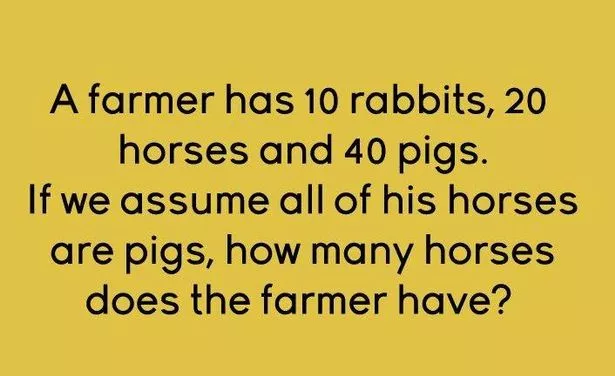A tricky riddle circulating on social media asks people to figure out how many horses a farmer has – and the answer might not be as obvious as you think.
01:00, 07 Aug 2025

A perplexing riddle about farmyard animals has a simple answer, but many people find themselves baffled by it.
Some lateral thinking, patience and some faith in your own mental abilities should enable you to solve this riddle, which asks: “A farmer has 10 rabbits, 20 horses and 40 pigs. If we assume all of his horses are pigs, how many horses does the farmer have?” If you can’t, don’t fret. We have a clue beneath the picture below.
According to the brainteaser featured on Baba Mail, only five per cent of people can answer it. Clue: just trust your instincts on this one. The language in the riddle is designed to mislead you, but you just need to apply some common sense. If you’re still baffled. See the answer below. In other related news, you’ll need a 20/20 vision to stop hidden dogs among sea of cats.
READ MORE: Only 25% can find missing diamond ring in less than 30 secondsREAD MORE: Seven bonkers conspiracy theories that prove there’s nothing new about fake news

Answer: the answer is of course 20 horses. Baba Mail stated: “20 of course. Assumptions can’t change the fact that horses are horses.”
If you found the answer a bit irritating, that’s understandable too. Lots of people think and act very differently to others and some answers that are obvious to you might not be clear to others. Brainteasers are a fantastic way of keeping your mind sharp, but they can often trick us. Certain optical illusions can leave us feeling very puzzled, for instance.
The Dean McGee Eye Institute explained: “There are occasions when the brain is unsure of what it sees. Optical illusions occur when your eyes are presented with colours, lights, patterns, borders or areas of contrast that mislead the brain. It tries to piece together images using optical clues, learned assumptions and past visual experiences. In these cases, there is a difference between the reality of what you see and what your brain thinks you see. As a result, your brain makes a guess and is tricked into seeing something that does not exist, or it struggles to decide between alternating versions of an image.”
READ MORE: Only one in 10 people can spot hidden face in confusing optical illusion
Tackling tricky puzzles, brainteasers and optical illusions could help sharpen your mental abilities, enhance productivity and strengthen memory, though. It’s unlikely to cause any damage whatsoever if you regularly tackle puzzles.
Nicole M. Avena, PhD, assistant professor of neuroscience at the Mount Sinai School of Medicine in New York City and visiting professor of health psychology at Princeton University revealed: “While some studies show that brain training games are not effective, the recollection and work that the brain does during these games keeps your mind fresh and alert… Brain functions that you practise during these games-and the repetition of them-can help improve response time and sharpness.”









